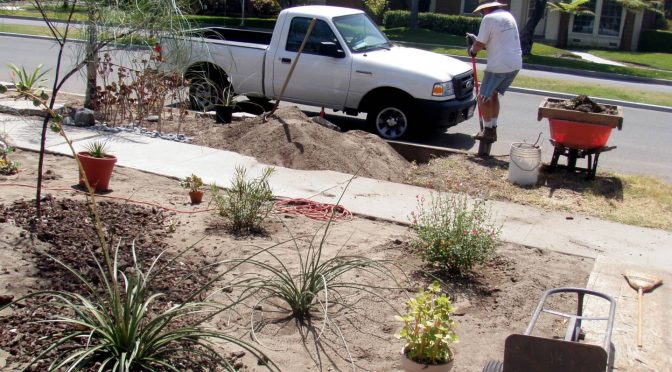Category: Climate Change
-
Surprising Victims Of Climate Change: Ghost Forests
As seas continue to rise they seem certain to continue killing coastal forests, leaving only the specters of logs behind. In New Jersey, as elsewhere, that will mean less forestland — unless humans or nature find ways of fostering seedlings in fields currently used for farming. (Click on title for full story.)
-

Irrigation Kills? Landscaping For Drought Can Make Some Regions More Livable
At night, the modeling projected a cooling effect from the changing landscapes that would be exceed the daytime warming effect. Across L.A., nighttime lows were projected to fall by an average of nearly 6°F if irrigation suddenly ended. (Click on title for full story.)
-
Climate Change Pushes Coffee Growers To The Brink
Climate change is going to halve the area suitable for coffee production and impact the livelihoods of more than 120 million of the world’s poorest people who rely on the coffee economy, according to a new report (Click on title for full story.)
-
It Takes A Community. Some Plant Species Do Not Adapt To New Neighbors
If plants evolved to elevated carbon dioxide in one neighbourhood, then experienced elevated carbon dioxide in a different neighbourhood, the benefits disappeared. This result was very surprising to us. (Click on title for full story.)
-
When Hybrids Are Better Able To Survive Change Than Their Parents Are
While hybrids might be expected to be a blend of the two parent species, the researchers found that they tended to have shorter and wider flower openings than both of the parent species which means that a wider range of pollinators can enter the flowers. By allowing a wider range of insects to pollinate them, hybrids make themselves much less vulnerable to the extinction of a single pollinator. (Click on title for full story.)
-
Attacking The Problem: Control Tropical Vines To Preserve Carbon Sink
Scientists advocate the temporary removal of lianas in selected areas to help tropical forests grow back. (Click on title for full story.)
-
The Death Of Underwater Forests
Before the heat wave, the kelps stretched over 800 kilometers of Australia’s western flank and cover 2,200 square kilometers. After the heat wave, Wernberg and Bennett found that 43 percent of these forests disappeared, including almost all the kelps from the most northerly 100 kilometers of the range. “It was just heartbreaking,” says Bennett. (Click on title for full story.)
-
Saltmarsh Restoration: Cost-Effective Strategy To Cope With Sea Level Rise
The restoration of currently occupied saltmarshes in temperate zones with an abundant input of sediments could be put forward as a strategy of cost-effective adaptation to counteract the effects of the rise in sea level. (Click on title for full story.)
-
Trees May Actually Instigate Rain
Since the experiment showed molecules of pinene naturally combining with one another when subjected to conditions that resembled those in the upper atmosphere, and since pinene is itself built of stuck-together isoprenes, it’s possible that the specific structure of the molecules isn’t as important as their general chemical makeup, consisting of multiple carbon atoms linked together into a long hydrocarbon. If so, this would be enormously significant—roughly 600 million tons of isoprene are released into the atmosphere each year by trees and shrubs. (Click on title for full story.)
-
Warming Climate Reduces Floral Scent, Leaving Pollinators Clueless
Increases in temperature associated with the changing global climate are interfering with plant-pollinator mutualism, an interaction facilitated mainly by floral color and scent. (Click on title for full story).
